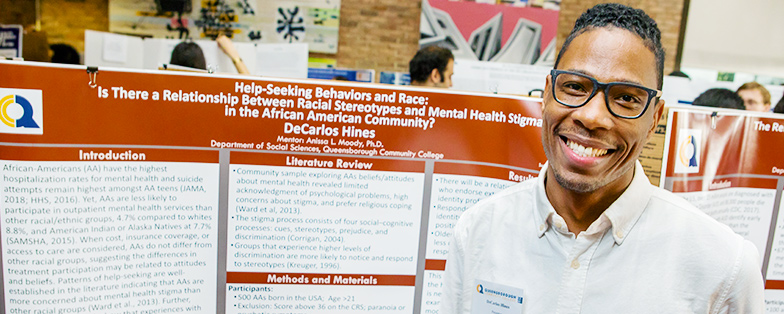Erasing Stigma: Alum Returns to present his Findings on Mental Health in the African American Community at Queensborough’s 4th Annual Undergraduate Research Day
DeCarlos Hines, ’19, was among the throngs of Queensborough students, faculty and staff at the College’s fourth annual Undergraduate Research Day held on December 6.
Hines, who resides in Elmhurst, Queens, participated in Queensborough’s 2019 Summer Intensive Research Program (SIRP).
His research focused on why African Americans do not seek mental health services.
“The stigma African Americans face regarding mental health can be traced back to slavery. We had to protect ourselves because the slightest illness would render us useless, not to mention a mental health issue. The community often guards itself because the stigma that if one seeks mental health services, one becomes “weakened” or “crazy” which is often emasculating to black males and strips black women of the pride that they hold within the community.”

His findings sparked his interest to dig deeply into which parts of the black community that do or don’t believe in mental health services.
Hines surveyed 500 African Americans who were born in the U.S. to determine a correlation between age and the stigma of mental health in the black community.
“The research shows that negative attitudes toward mental illness in the African American community are shaped from an early age and as people get older they are less likely to seek services. This stigma is passed down from generation to generation and it gets stronger with each generation. So what happens is that members of the community get stuck within the bubble of the mindset.”
Hines, a first semester student at John Jay College of Criminal Justice, was mentored Dr. Anissa Moody, Associate Professor, Social Sciences at Queensborough.
“Conducting research with Dr. Moody steered me toward opportunities that I otherwise would not have known about. SIRP positioned me to conduct research at John Jay with other graduate students and doctoral students. I am the only undergraduate student in the lab.”
Hines is also delving into research on racial stereotypes. “The media projects that black on black crime is high and they do not cover nearly as much on white on white crime which reflects back on racial stereotypes in the community,” he said.
Another area of research interest is mental well-being among African Americans in college.
Hines plans to obtain his bachelor’s and master’s degree at John Jay’s BA/MA program in Forensic Psychology and go straight through to a doctoral program in clinical psychology and work within the family court system.
“When we look at stats now we have more police than counselors in our public schools. I am a proponent of switching that around: Our children do not need more police in their schools, they need more mental health counselors and psychologists.” Nearly 1 in 5 adults in the U.S. have some form of mental illness. African Americans make up 14 % of the U.S. population and 16.5% have mental illness and that is only what is reported because of the stigma.
“I cannot express enough the importance of Queensborough in my success at John Jay. It would have been virtually impossible for me to conduct research there with two research teams led by world renowned psychologists. I have used SIRP as a pipeline to other programs that will further my education and career in the long term.”
“Only 1% of clinical psychologists in the world are African American men! I am proud to say that I am heading towards that direction to both increase that number and to be a beacon of light to the black community and to other African American men seeking this field. Having someone like Dr. Moody as a champion in my corner is priceless.”
“The vast majority of Queensborough professors gave me advice—showed me the ropes and took me to the next level in my studies and in my future career as a clinical psychologist. What was so amazing about Dr. Moody is that she went above and beyond recommending courses and programs. She helped me parse out my career ideas to a specific area of expertise and that is how I fell in love with studying forensic psychology within the family court system.”
“I went in ignorant of what research really is and I came out understanding investigation, statistics and how to question your own findings. I learned to look beyond my personal shortcomings, to ask questions, reframe problems and try new approaches. As a result of SIRP, I know how to find my way around a problem when I hit a brick wall. Through this process, I became a better researcher, and ultimately a better person.”
###



